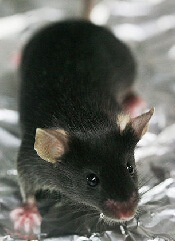User login

Scientists say they’ve identified a tumor-associated lipid that successfully stimulates T cells to kill leukemia cells in vitro and in vivo.
The team noted that certain T cells can recognize the presentation of self-derived lipids on the CD1c protein.
These T cells are commonly found in healthy individuals and are known to kill transformed hematopoietic cells.
However, their antigen specificity and potential antileukemic effects have not been well characterized.
So Gennaro De Libero, MD, PhD, of the University Hospital Basel in Switzerland, and his colleagues analyzed these cells and reported their findings in The Journal of Experimental Medicine.
The researchers discovered that CD1c self-reactive T cells recognize a novel class of self-lipids called methyl-lysophosphatidic acids (mLPAs), which were abundant in several human leukemias.
These mLPAs are the first example of lipid tumor-associated antigens (TAAs). TAAs are produced by tumors and stimulate T cells that can kill leukemia cells.
However, protein TAA accumulation can be drastically reduced by variant leukemia cells. And some TAAs may change their structure, which prevents recognition by T cells and facilitates tumor evasion.
mLPAs, on the other hand, do not change their structure and remain abundant in leukemia cells.
Furthermore, Dr De Libero and his colleagues found they could isolate the T cells that recognize and kill mLPA-expressing leukemia cells in in vitro tests.
And when the team transplanted the T cells into mice, the cells displayed therapeutic efficacy against leukemia cells.
The researchers noted that this type of immunotherapy, if proven effective in humans, could be used to help prevent leukemia relapse after chemotherapy or stem cell transplant. ![]()

Scientists say they’ve identified a tumor-associated lipid that successfully stimulates T cells to kill leukemia cells in vitro and in vivo.
The team noted that certain T cells can recognize the presentation of self-derived lipids on the CD1c protein.
These T cells are commonly found in healthy individuals and are known to kill transformed hematopoietic cells.
However, their antigen specificity and potential antileukemic effects have not been well characterized.
So Gennaro De Libero, MD, PhD, of the University Hospital Basel in Switzerland, and his colleagues analyzed these cells and reported their findings in The Journal of Experimental Medicine.
The researchers discovered that CD1c self-reactive T cells recognize a novel class of self-lipids called methyl-lysophosphatidic acids (mLPAs), which were abundant in several human leukemias.
These mLPAs are the first example of lipid tumor-associated antigens (TAAs). TAAs are produced by tumors and stimulate T cells that can kill leukemia cells.
However, protein TAA accumulation can be drastically reduced by variant leukemia cells. And some TAAs may change their structure, which prevents recognition by T cells and facilitates tumor evasion.
mLPAs, on the other hand, do not change their structure and remain abundant in leukemia cells.
Furthermore, Dr De Libero and his colleagues found they could isolate the T cells that recognize and kill mLPA-expressing leukemia cells in in vitro tests.
And when the team transplanted the T cells into mice, the cells displayed therapeutic efficacy against leukemia cells.
The researchers noted that this type of immunotherapy, if proven effective in humans, could be used to help prevent leukemia relapse after chemotherapy or stem cell transplant. ![]()

Scientists say they’ve identified a tumor-associated lipid that successfully stimulates T cells to kill leukemia cells in vitro and in vivo.
The team noted that certain T cells can recognize the presentation of self-derived lipids on the CD1c protein.
These T cells are commonly found in healthy individuals and are known to kill transformed hematopoietic cells.
However, their antigen specificity and potential antileukemic effects have not been well characterized.
So Gennaro De Libero, MD, PhD, of the University Hospital Basel in Switzerland, and his colleagues analyzed these cells and reported their findings in The Journal of Experimental Medicine.
The researchers discovered that CD1c self-reactive T cells recognize a novel class of self-lipids called methyl-lysophosphatidic acids (mLPAs), which were abundant in several human leukemias.
These mLPAs are the first example of lipid tumor-associated antigens (TAAs). TAAs are produced by tumors and stimulate T cells that can kill leukemia cells.
However, protein TAA accumulation can be drastically reduced by variant leukemia cells. And some TAAs may change their structure, which prevents recognition by T cells and facilitates tumor evasion.
mLPAs, on the other hand, do not change their structure and remain abundant in leukemia cells.
Furthermore, Dr De Libero and his colleagues found they could isolate the T cells that recognize and kill mLPA-expressing leukemia cells in in vitro tests.
And when the team transplanted the T cells into mice, the cells displayed therapeutic efficacy against leukemia cells.
The researchers noted that this type of immunotherapy, if proven effective in humans, could be used to help prevent leukemia relapse after chemotherapy or stem cell transplant. ![]()